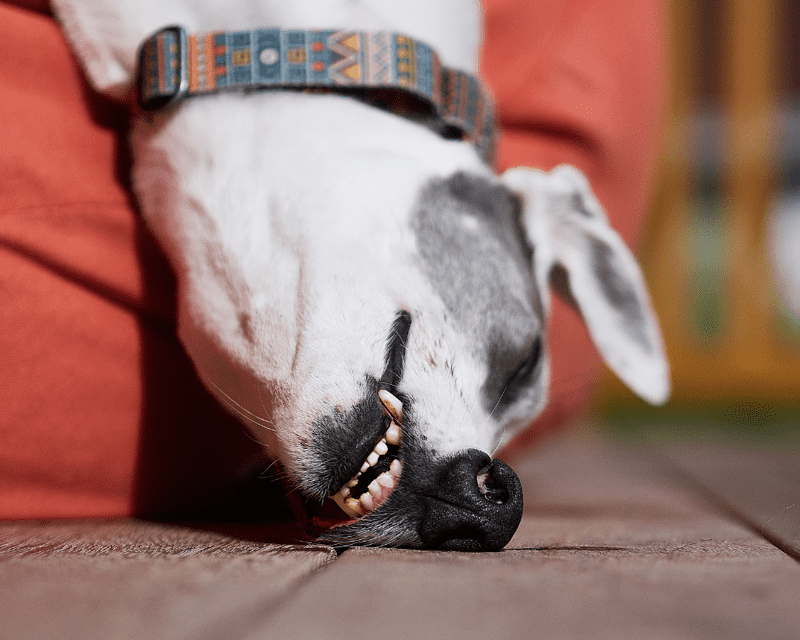If you’ve noticed that your dog seems to be getting lazier day by day, you’re not alone. Many dog owners experience this same issue with their furry companions. But what could be causing your dog to become increasingly inactive?

It’s common for dogs to slow down as they age. However, if your dog seems to be getting lazier daily, there may be underlying causes for this change in behaviour. It’s understandable to be concerned if you notice that your dog is getting lazier daily. However, it’s important to remember that there can be many different reasons for this change in behaviour, and not all of them are cause for worry. While some reasons depend on the dog’s health, others may depend on factors beyond its control, such as its routine and environment.
Here are some possible reasons for your dog’s increased lethargy:
1. Your dog is experiencing pain or discomfort
Dogs will often become less active if they are in pain or discomfort. This can be caused by a variety of conditions, such as arthritis, dental problems, or internal injuries. If your dog is experiencing pain or discomfort, it may become less active, may sleep more than usual, and may exhibit changes in its behaviour, such as avoiding certain activities or seeming more clingy or anxious.
If you notice that your dog is slowing down and seems to be in pain, it’s important to take them to the veterinarian for a check-up. Your veterinarian can conduct a physical examination and may recommend diagnostic tests, such as x-rays or blood work, to help identify the underlying cause of your dog’s pain or discomfort.
Once the cause of your dog’s pain or discomfort has been identified, your veterinarian can provide you with guidance and support to help your dog manage their symptoms and maintain its health and well-being. This might include prescribing medications or other treatments, recommending lifestyle changes, or referring you to a specialist for further care.
2. Your dog is dealing with a health issue
In addition to age and a lack of exercise, your dog’s laziness could be due to an underlying health issue. Conditions such as obesity, diabetes, and thyroid problems can all cause dogs to become less active. If you’re concerned that your dog’s laziness may be due to a health issue, it’s important to talk to your veterinarian to determine the underlying cause and receive appropriate treatment.
3. Your dog is not getting enough exercise
Dogs are naturally energetic animals, and just like humans, they need regular physical activity to stay healthy and happy. If your dog isn’t getting enough exercise, he may become lethargic and inactive. This is especially true for high-energy breeds, who may need more daily exercise than other dogs. Another way to provide your dog with good exercise is to engage in training sessions with him.
Training sessions not only provide your dog with the opportunity to learn new skills and commands, but they also provide him with a way to recharge and feel energetic. You can also provide your dog with mental stimulation by exposing him to new sights, sounds, and smells. Taking your dog for walks in different environments, for example, can provide him with new experiences and keep his mind active and engaged. Ensure that your dog has a great leash for its walks, such as options from Alpine Dog.
4. Your dog is not getting enough mental stimulation

In addition to physical exercise, dogs also need mental stimulation to stay engaged and happy. If your dog is bored, it may become lazy and inactive. Try providing your dog with toys and activities that challenge their minds, such as puzzle toys or training sessions. One way to provide your dog with mental stimulation is to give him toys and activities that challenge his mind. Puzzle toys, for example, often require your dog to solve a problem or figure out how to access a treat, which can provide him with mental stimulation.
5. Your dog is not getting enough nutrition
Proper nutrition is essential for a dog’s overall health and well-being and can have a direct impact on its energy levels and behaviour. If your dog is not getting enough of the right nutrients, it may become lethargic and inactive and may be more prone to health problems.
To ensure that your dog is getting the nutrition they need, it’s important to feed them a high-quality, balanced diet. This means choosing a dog food that is appropriate for your dog’s age, breed, and size and that is formulated to meet its nutritional needs. You can look online through things like these Dr. Marty’s Nature’s Blend reviews to find a food which has had positive reception by other dog owners that includes all the essentials for your dog to thrive. It’s also important to provide your dog with enough food to meet its caloric needs based on its size, age, and activity level.
6. Your dog is experiencing changes in its environment
Dogs are creatures of habit, and they can become stressed or anxious when their routine or environment is disrupted. If your dog is experiencing changes in its environment, such as moving to a new home or welcoming a new pet into the family, it may become less active or lethargic as they adjust to the new situation.
To help your dog cope with changes in its environment, it’s important to provide them with a sense of stability and predictability. This might mean maintaining their regular feeding and exercise routine, providing them with a quiet and safe space to retreat to when they need to relax, and offering extra support and comfort during the transition period.
7. One possible reason for your dog’s newfound laziness is age
As dogs get older, they naturally start to slow down and become less active. This is a normal part of the ageing process and is especially common in larger breeds, which may develop joint problems and other age-related health issues that can make it difficult for them to move around and be as active as they once were.
If your dog is showing signs of age-related laziness, it’s important to provide them with extra support and care to help them maintain their health and well-being. This might include providing them with a comfortable and supportive bed, offering joint supplements to help keep their joints healthy, and adjusting their diet to meet their changing nutritional needs.
Final thoughts

In conclusion, there are many possible reasons why your dog may be getting lazier day by day. From age and a lack of exercise to health issues and changes in the environment, there are many factors that can affect your dog’s level of activity.
If you’re concerned about your dog’s laziness, it’s important to talk to your veterinarian to determine the underlying cause and receive appropriate treatment. Your veterinarian can conduct a physical examination and may recommend diagnostic tests to help identify any underlying health issues that may be contributing to your dog’s inactivity.
Once the cause of your dog’s laziness has been identified, your veterinarian can provide you with guidance and support to help your dog maintain their health and well-being. This might include providing your dog with extra support and care, adjusting their diet and exercise routine, or recommending medications or other treatments to help manage any underlying health issues.

